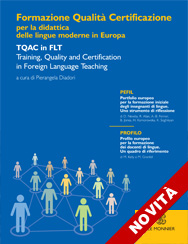Edited by Pierangela Diadori
FORMAZIONE, QUALITA’ CERTIFICAZIONE PER LA DIDACTIC DELLE LINGUE MODERNE IN EUROPA
TQAC in FLT Training, quality and Certification in Foreign Language Teaching With an Italian translation of PEFIL European Portfolio for the beginning training of language teachers. An instrument for reflection (Newby, Allan, Fenner, Jones, Komorowska, Soghikyan)
Profile
European profile for the training of language teachers. A frame of reference (Kelly, Grenfell)
Who it's for
Experts in the teaching of modern languages, foreign language teachers (in Italy and abroad), heads of Italian and foreign institutions which offer language courses, foreign language teacher trainers who operate in Italy and abroad, staff of public and private institutions in the sectors of personnel selection and entry-level training courses and managers of public and private institutions aware of the importance of a multilingual education and of the beneficial social resource that is language knowledge.
Contents
The volume was born from the need, at more than a decade from the diffusion of the QCER, to reflect upon the questions connected to the training of modern language teachers, particularly in Europe, on the principles which determine the quality of teaching available, on the most innovative methods for the evaluation and the certification of teachers’ competences and desires to diffuse the most important research and experience across European countries and to compare the experiences of quality training of second language teacher in Europe and elsewhere.
The first part of the volume summarises the training of language teachers in Europe. In the second part the most significant university experiences in the field of the training of English, Italian, Spanish, German, French, Dutch, Turkish (as an example of a language spoken in one of the countries aspiring to become a part of the EU) and Arabic (as an example of one of the “immigrant” languages into Europe) are collected.
To close the volume are the Italian translations of two important documents realised with the support of the European Commission, which have the goal of harmonising and directing the training of foreign language teachers in Europe:
European Profile for Language Teacher Training – A Frame of Reference (Kelly and Grenfell, University of Southampton) A document realised for the ECML (European Centre for Modern Languages) project: Dal Profilo al Porfolio: un quadro di riferimento per la riflessione nella formazione dei docenti di lingua, which has the goal of harmonising the training of language teachers in Europe. The Profile traces 40 points, divided and described in four sections: Structure, Knowledge and Comprehension, Knowing and Understanding and Values These describe the common frame of reference for those who work in the field of training foreign language teachers, for primary school level, secondary school level, or to adults. It is a flexible framework since it takes into account strategies for autonomous learning, permanent learning and new learning environments. Nearly 40 points can be used both for itinerary verification of the process of foreign language teacher training, and as a guide to improve training and curricula.
European Portfolio for Student Teachers of Languages. A reflection tool for language teacher education – EPOSL (Newby et al.) also this document was born from the ECML project. It is destined for language teachers and has the goal of encouraging them to reflect on the knowledge and didactic abilities necessary to teach languages, to self-evaluate their own didactic competences and to allow them to monitor their progress and to take note of the experiences of teaching, thus developing a guided foreign language learning awareness from self-evaluation and from the practice of reflection, which helps teachers to reach a higher awareness of their strengths and weaknesses relative to teaching and which helps them to promote discussion and comparison between training subjects, between teachers and trainers. It includes a section on reflections, a section of self-evaluating (193 competence descriptors), a dossier, a glossary, a summary of the terms used as descriptors, a handbook for use.
The Editor
Pierangela Diadori is Associate Professor of Modern Language Didactics and Directors of the “Centre for Research and Service DITALS” (Certification of Didactic Competence of Italian for Foreigners) at the University for Foreigners in Siena. She is director of the Master DITALS and of the Master in “Editorial planning for Italian as a Second Language” (in the classroom and through e-learning).
-
 Processi di apprendimento linguistico e gestione della classe ad abilità differenziate
Processi di apprendimento linguistico e gestione della classe ad abilità differenziate
CatalogueDidactic Methodology
-
 Apprendimento linguistico e costruzione dell'identità plurilingue
Apprendimento linguistico e costruzione dell'identità plurilingue
CatalogueDidactic Methodology
-
 Insegnare italiano a stranieri
Insegnare italiano a stranieri
CatalogueDidactic Methodology
-
 COLLANA ILM Insegnare le lingue moderne
COLLANA ILM Insegnare le lingue moderne
CatalogoMetodologia didattica
-
 Atti del Convegno GEORGETOWN UNIVERSITY
Atti del Convegno GEORGETOWN UNIVERSITY
CatalogueDidactic Methodology
-
 Atti del XVIII Convegno nazionale ILSA
Atti del XVIII Convegno nazionale ILSA
CatalogueDidactic Methodology





